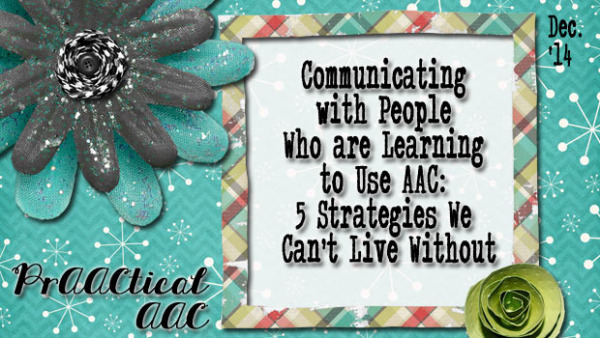Communicating with People Who are Learning to Use AAC: 5 Strategies We Can’t Live Without

- Don’t pre-empt: Give them a chance to express themselves by not automatically anticipating and meeting every need they have. What can make us nurturing caregivers sometimes gets in the way of building new communication skills.
- Create opportunities: Engineer those ‘teachable moments’ by using communication temptations. Making them want to communicate is half the battle.
- Slow down and pause: Nature abhors a vacuum. And we SLPs have a terrible time NOT talking. That’s a shame, really, because those ‘perfect pauses’ are wonderful teaching tools.
- Speak AAC: We can’t say this often enough. To teach someone to communicate with AAC symbols, we must speak to the learners using those same tools. When we want someone to use their communication aid more often, we make it a priority for US to use the AAC more frequently. That’s just how it works for beginning communicators.
- Prompt wisely: A little prompting is a good and necessary thing. Too much prompting causes more problems than it solves.
What are your ‘must do’ strategies for communication partners? We’d love to hear about them.
Filed under: PrAACtical Thinking
This post was written by Carole Zangari

1 Comment
Well said. As a recently retired Early Intervention Specialist from36 years of service . I have spent countless hours being an advocate of this model I have shared with hundreds of parents and children this intervention model. As a graduate student I still recall Dr. James MacDonald from Ohio State University he always stressed that communication is like ping pong you take a turn and then I take a turn….it is a turn balanced interaction regardless of what method used and you need to be anaminated and creative! Do what ever you can to get the interaction going and keep it going. Dr. MacDonald stressed we live in a social world that is dependent on communication we have a responsibly to build functional and successful communication abilities. Keep up the good work. Debbie. Ahrns